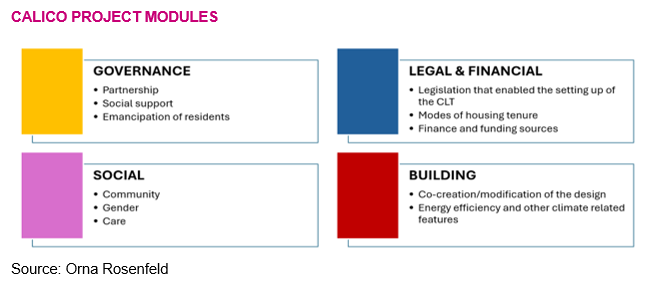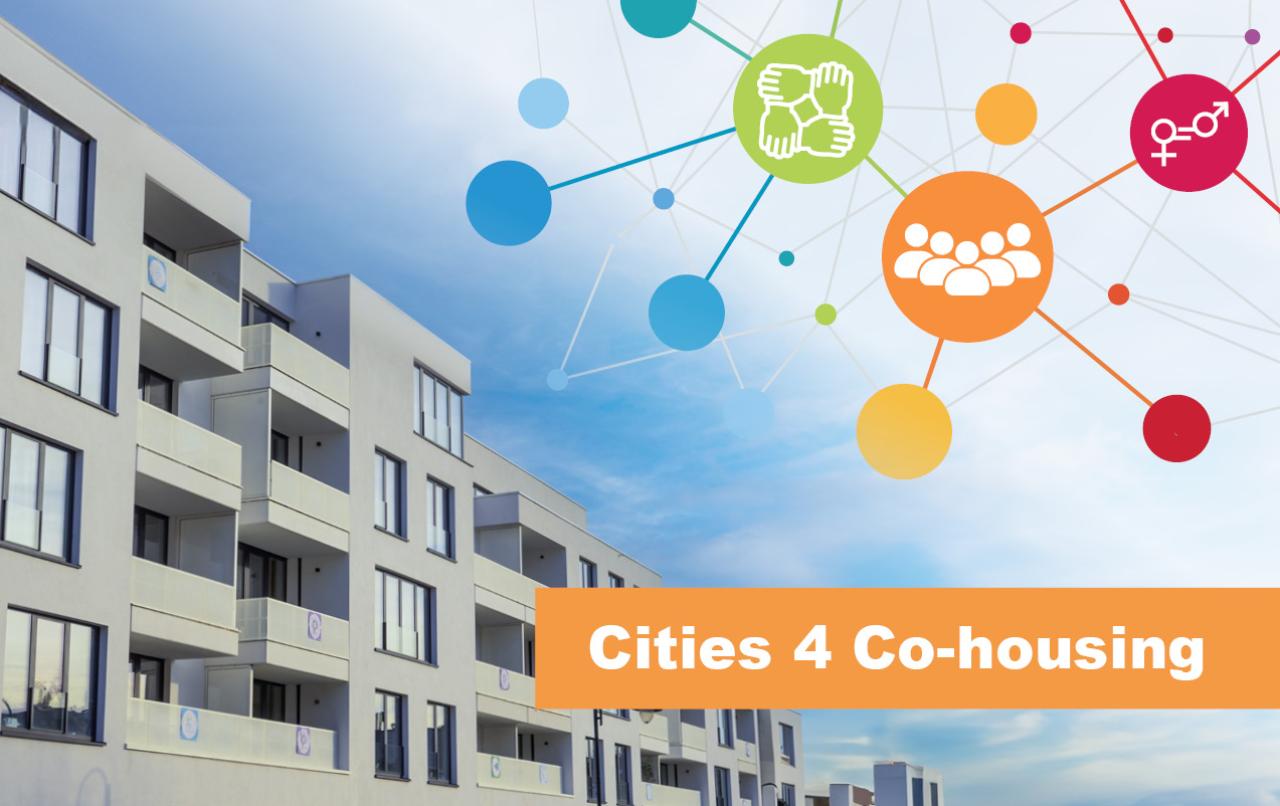Housing Affordability in the EU: The Role of the Cities4Co-housing Network
The lack of housing affordability is a shared concern across the EU. Between 2015 and 2023, house prices rose by an average of 48%, according to the European Parliament. Rents also increased significantly—by 18% between 2010 and 2022—driven partly by the growth of short-term rentals, which reduced the availability of long-term housing. These trends have exacerbated inequality and pushed growing numbers of Europeans into housing precarity.
According to the July 2024 Eurobarometer survey, rising housing costs—together with broader cost-of-living pressures—were among the top concerns shaping citizens’ choices in the European elections. In response to this urgent issue, the new European Commission appointed Dan Jørgensen as the EU’s first Commissioner for Housing, supported by a dedicated Housing Task Force to coordinate efforts and create synergies across EU housing policies.
While the housing crisis plays out at national and EU levels, its most immediate impacts are felt in cities. Urban areas across Europe are grappling with the complex, interconnected pressures of affordability, availability, and social inclusion. Addressing these challenges demands innovative approaches that go beyond conventional housing solutions.
This is where the Cities4Co-housing Innovation Transfer Network (ITN) steps in. As part of the URBACT programme, the network fosters collaboration among municipalities to transfer and adapt successful practices. The Cities 4 Co-housing network builds upon the success of CALICO, an innovative collaborative housing model in the Brussels Capital Region which pioneered a co-housing model that combines long-term affordability with community land trust principles, gender inclusivity community-based care services.
The Cities4Co-housing network brings together five partner cities—Thessaloniki (Greece), Naples (Italy), Nikšić (Montenegro), Vila Nova de Gaia (Portugal), and Fuenlabrada (Spain)—each committed to reimagining housing through inclusive, community-led solutions. By examining CALICO’s key components, five partner cities are exploring how to transfer and implement elements of the CALICO model in response to their own housing needs.
At its core, the network aims to promote access to affordable housing while rekindling a sense of community—reviving forms of living that emphasise solidarity, sustainability, and mutual support that characterised these South European cities throughout history. By empowering urban practitioners to rethink housing delivery, Cities4Co-housing contributes to shaping more equitable and resilient urban futures.
The Transferability Study: key takeaways
Within the URBACT framework, Cities4Co-housing fosters peer learning and knowledge-sharing, equipping cities with practical tools to implement long-term solutions that advance affordability, social cohesion, and inclusive urban development. A cornerstone of this process is the Transferability Study (TS), which lays the groundwork for the network’s activities. The TS addresses a key question: how can the CALICO project be adapted to meet the unique contexts, needs, and priorities of each partner city?
Like other Urban Innovative Actions (UIA) winning projects, CALICO is both comprehensive and complex. Direct replication of its approach is neither advisable nor feasible, given the diverse policy, legal, and financial environments of the transfer partner cities. Moreover, as demonstrated during the study visits, each city is interested in different aspects of the CALICO model, reflecting their local realities and strategic priorities.
Rather than attempting a direct replication of CALICO, the Cities 4 Co-housing transferability study prepared for this network identified four core modules withing CALICO project that the partner cities can adapt based on their interest and capacity:

1. Governance
Creating multi-stakeholder partnerships that include municipalities, cooperatives, and civil society organizations.
Establishing participatory governance structures where residents play an active role in decision-making.
Developing social support structures to help communities manage collaborative housing projects effectively.
2. Social Integration
Designing intergenerational and mixed-income housing solutions.
Addressing the needs of vulnerable groups such as elderly residents, single mothers, and low-income families.
Embedding community-based care models that link housing with health and social support services.
3. Legal and Financial Structuring
Implementing the Community Land Trust (CLT) model to maintain long-term housing affordability.
Exploring alternative financing mechanisms, including social investment and residents cooperatives and EU funding.
Adapting tenure arrangements to local legal frameworks to support social and affordable housing.
4. Building Design and Sustainability
Employing participatory design processes that involve future residents in shaping their living environments.
Integrating energy-efficient and climate-responsive housing strategies.
Creating adaptable living spaces that accommodate community-oriented living and private spaces.
City-Level Adaptations: How Partner Cities Are Envisioning to Apply CALICO’s Modules
Each partner city brings its own distinct urban, social, and economic context, shaping how the principles of CALICO can be interpreted and applied locally. The city visits conducted by the Lead Partner and Lead Expert between October and December 2024 offered valuable insights into each city’s specific interests in adapting CALICO’s various modules, as well as their existing assets, limitations, and institutional capacities in doing so.
Here’s a snapshot of the key takeaways:
Vila Nova de Gaia, Portugal: With substantial EU funding dedicated to social housing expansion, Vila Nova de Gaia aims to integrate learnings from CALICO to foster long-term affordability and resident involvement. However, adapting the CLT model remains challenging due to local legal constraints.
Thessaloniki, Greece: The absence of a national social housing framework makes Thessaloniki particularly focused on CALICO’s legal and financial structures. The city plans to utilize vacant properties for affordable collaborative housing, though regulatory gaps and funding uncertainties present hurdles.
Naples, Italy: Faced with rising housing costs and the displacement effects of tourism-driven short-term rentals, Naples sees collaborative housing as a way to strengthen local communities. The city is particularly interested in CALICO’s model to protect vulnerable populations from housing instability.
Fuenlabrada, Spain: With a history of cooperative housing, Fuenlabrada is working to integrate CALICO’s community-care approach into existing affordable housing initiatives and the EUI Share project. The main challenge lies in scaling these solutions while keeping housing costs manageable.
Nikšić, Montenegro: As a smaller city with limited affordable housing options, Nikšić pioneering transfer of collaborative housing models inspired by CALICO will bring novelty to the region. These efforts aim to demonstrate the feasibility of resident-led housing initiatives in the region.
Strategics Insights and Next Step
The transferability study highlights that while CALICO cannot be copied wholesale, the modular framework developed for it provides cities with manageable modules and sub-modules to choose from. Key factors for successful implementation will include:
Aligning with Local Policies: Ensuring collaborative housing models fit within national and municipal housing strategies to secure long-term institutional support.
Engaging Stakeholders: Encouraging cooperation between municipalities, residents, and private-sector actors to foster sustainable governance models, starting from the URABCT Local Groups.
Exploring Diverse Funding Sources: Leveraging EU funds, social investment initiatives, and public-private partnerships to maintain affordability.
Building Community Ownership: Empowering residents to take an active role in shaping and managing their housing projects.
A Roadmap for Cities 4 Co-Housing Partner Cities
The Cities4Co-housing network stands as a powerful example of how collaboration can drive meaningful responses to Europe’s housing crisis. Through the URBACT framework, participating cities benefit from transnational learning and exchange, enabling them to adapt innovative practices, refine and shape local strategies that reflect their unique contexts.
Southern Europe, where the partner cities are located, faces particularly acute challenges: the region has the lowest share of social and affordable housing in the EU, is disproportionately impacted by the rise of short-term rentals and suffers diminishing sense of community that characterised it in the past. At the same time, cities in this area are actively exploring innovative solutions to tackle the escalating housing crisis.
As European cities grapple with housing affordability, demographic shifts, and sustainability challenges, the CALICO model and ITN partnership offers valuable lessons. The next steps involve continued in-depth examination of the CALICO modules, development of continuity and investment plans as well as experimentation, adaptation, and practice integration, ensuring that collaborative housing solutions remain viable and scalable in diverse urban contexts of ITN partners and beyond.
By embracing this collaborative, community-led approach, partner cities are laying the groundwork for more inclusive, sustainable, and resilient housing systems—benefiting both current residents and future generations.


